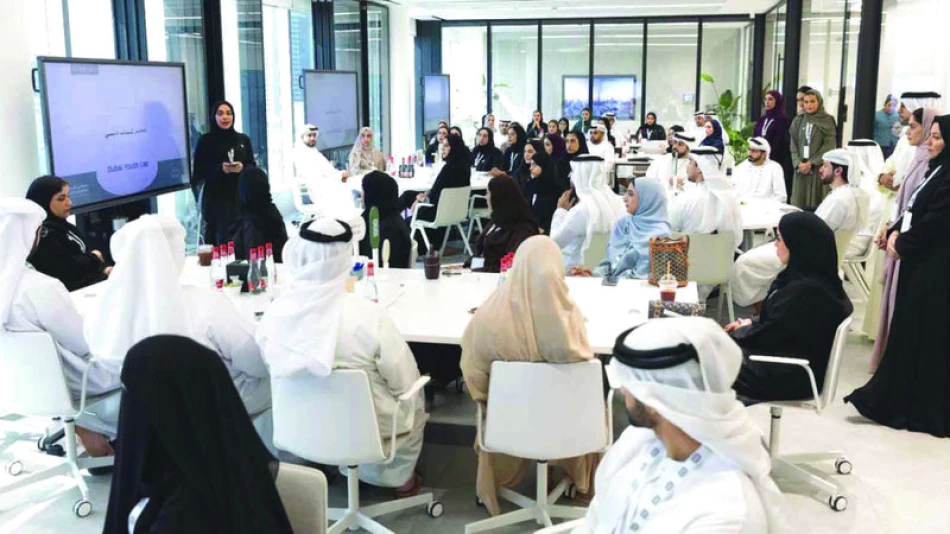
Young Dubai Innovators Tackle Pressing Community Issues in Dynamic Dialogue
Dubai Positions Itself as Global Youth Empowerment Hub with Strategic Policy Lab Initiative
Dubai has launched an ambitious youth engagement program that goes beyond traditional consultation models, positioning young citizens as direct contributors to government policy-making. The "Dubai Youth Lab," timed with International Youth Day, brought together over 60 young professionals with senior government officials to tackle real governance challenges—a move that signals the emirate's commitment to integrating youth perspectives into its Dubai 2033 strategic plan.
Beyond Consultation: Youth as Policy Architects
The initiative, organized by Dubai Youth Council in partnership with the Knowledge and Human Development Authority Youth Council, represents a significant departure from conventional youth engagement strategies. Rather than limiting young people to advisory roles, participants were given actual government case files based on real challenges and tasked with developing implementable solutions.
Dr. Sultan Al Neyadi, UAE Minister of State for Youth Affairs, emphasized that youth empowerment has become a strategic investment reflecting leadership confidence in young people's capacity to maintain national security and stability. This approach aligns with broader Gulf Cooperation Council trends toward youth integration in governance structures.
High-Level Government Participation Signals Serious Intent
The event's attendee list reads like a Dubai government directory: Abdullah Al Basti, Secretary-General of Dubai's Executive Council; Dr. Thani Al Zeyoudi, Minister of Foreign Trade; and directors general from major Dubai entities including the municipality, chambers of commerce, and human resources department. This level of senior participation indicates genuine commitment rather than ceremonial engagement.
Strategic Alignment with Dubai 2033 Vision
Al Basti's remarks positioned the youth lab as integral to Dubai's next-decade agenda, suggesting that youth input will directly influence policy formation for the emirate's 2033 strategic objectives. This integration model differs significantly from youth programs in other global cities, where young people typically participate in separate tracks rather than mainstream policy development.
The timing is strategically significant. As Dubai approaches the halfway point of its current strategic cycle, incorporating fresh perspectives becomes crucial for maintaining competitive advantage in areas like digital transformation, sustainability, and quality of life improvements.
Practical Implementation Over Theoretical Discussion
The lab's structure—dividing participants into working groups with real case files, followed by expert panel evaluation—mirrors professional consulting methodologies. Solutions were assessed on innovation, feasibility, and alignment with national priorities, suggesting that viable proposals may advance to implementation phases.
Aisha Miran from the Knowledge and Human Development Authority noted that participants demonstrated "maturity and readiness," producing actionable concepts rather than theoretical frameworks. This outcome-focused approach distinguishes Dubai's model from traditional youth forums that often generate enthusiasm but limited concrete results.
Regional Leadership in Youth Governance Integration
Dubai's approach positions it ahead of regional competitors in youth engagement sophistication. While other Gulf cities have established youth councils and advisory bodies, few have integrated young professionals directly into active policy development processes with senior decision-maker participation.
The initiative also supports Dubai's broader positioning as a global city attractive to young talent. By demonstrating that youth voices influence actual governance decisions, Dubai strengthens its appeal to the international young professional demographic that drives innovation economy growth.
Building Sustainable Engagement Channels
Reem Al Falasi, Dubai Youth Council President, outlined expected outcomes including enhanced policy analysis skills among young professionals, direct communication channels with decision-makers, and systematic integration of youth perspectives in government operations. This institutional approach suggests long-term commitment beyond one-off events.
The emphasis on teaching policy-making mechanisms to young participants creates a pipeline of governance-literate citizens who can contribute meaningfully to public sector development—a strategic asset as Dubai navigates complex global economic and social transitions.
Implications for Dubai's Competitive Positioning
This youth integration model serves multiple strategic purposes: enhancing policy quality through diverse perspectives, building citizen engagement and loyalty, and positioning Dubai as a forward-thinking governance model for other cities. As global cities compete for young talent and investment, demonstrating genuine youth empowerment becomes a differentiating factor.
The initiative's success could establish Dubai as a case study for effective youth-government collaboration, potentially attracting international attention and reinforcing the emirate's reputation for innovative governance approaches.
Most Viewed News

 Sara Khaled
Sara Khaled






